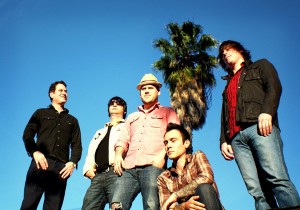Review: The Bronx (IV)
posted in: Reviews & Playlists • Rock

Photo by Lisa Johnson
If you were to ask a dedicated fan what “punk” means in 2013, you would probably receive a long-winded dissertation on innumerable subgenres. Make no mistake: this conversation might be interesting, but it is not informative. At its core, the spirit of punk has always entailed “ in one form or another “ the forging of an individual path in the midst of a sea of conformity. It has reveled in a promised escape from the drudgery of the nine to five existence, a comfortable suburban home, and the meaningless trappings of a materialistic middle class life. It rejects the enforcement of the status quo. It pushes ceaselessly back against mindless repetition. That is what punk still is.
What happens, then, when a punk band turns that same critical eye on its own career; a career built upon the inevitable and predictable annual cycles of album releases, touring, and promotion? The result is The Bronx (IV), if not the most ferocious album that Los Angeles’ The Bronx have released to date, then certainly the most self-reflective. Thankfully, singer Matt Caughthran‘s throat-tearing screams remain intact on this release. There is no restrained breathing, no Zen of Screaming here. Only what sounds like Caughthran practically bleeding through the microphone in feral glee.
His throaty howl serves the band well in their opening salvo, “The Unholy Hand.” Over a raucous, bluesy riff, Caughthran screams, “They got you working on the weekdays / They got you working on the weekends too / ¦ / Do you want to die or just come real close?” At this point, we know what we’re in for: the depiction of conformity as corrosive and soul destroying; creative souls crushed into corporate dust; the spirit of punk.

Photo by Ashley Maile
But as the middle of the album nears, the band’s tone undergoes a notable shift, both lyrically and instrumentally. Guitar riffs begin and end haltingly. There is even a song in the uncommon 6/8 time. “The inspiration, it comes and goes,” Caughthran sings on “Along For The Ride.” A sliver of possible self-reflection. “If you want advice / Of paying the price / Lightning strikes once / It does not strike twice,” he screams. While it may not be his intention, this sounds undoubtedly like the talk of a man who understands his band’s current position in the scene – where it has been, and most importantly, where it stands in relation to that Platonic ideal of punk, forever guiding young bands into the fray and abandoning them as they age gracelessly out of relevancy. “There’s no polishing this poverty / I’m passing my torch to the blind / I hope your luck’s better than mine,” Caughthran yells on “Torches.” He sees the new generation on the rise. They are younger and equally ambitious, but entirely ignorant of the necessary sacrifices and painful compromises that they will inevitably encounter further down the path, at which point Caughthran stands, looking back.
Suddenly, the band seems just as self-assured as on past releases, but in an entirely different manner. “Repetition makes us colder / death creeps a little bit closer,” sings Caughthran, and now it’s clear that he’s not just talking about a comfortable suburban life. Though punk portrays itself as diametrically opposed to mindless repetition, it “ secretly, shamefully “ can entail a mode of repetition almost identical to the style of corporate redundancy that it is so accustomed to denigrating. “Beginner’s luck became a creature of habit” Caughthran screams with abandon. It’s possible to keep doing the same thing forever if it’s comfortable. Punk bands play the same five chords. The same riffs. The same d-beats. Upon reflection, it is all repetition, and horrifyingly so.
Caughthran and The Bronx recognize this, which is remarkable and commendable. It also ultimately makes for a damn engaging album. On the closer, “Last Revelation,” Caughthran sings, “He worked the crowd like a man possessed / But there’s a church burning in his chest.” In this almost transparently autobiographical moment, the album fulfills its meditation on band life. The Bronx (IV) is searing, loud, and abrasive. But it also manages to coherently consider the implications of time spent in repetition, even if it is loving repetition. Some bands make the same album over and over again to try to please their fans. The Bronx seem to do it to please themselves. And there is nothing more punk than that.
More like this:
